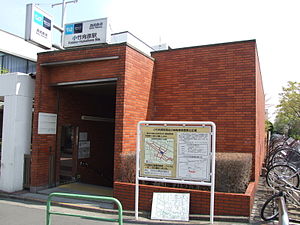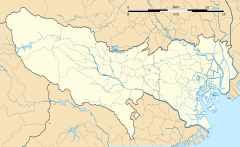Kotake-mukaihara Station
Y06 F06 SI37 Kotake-mukaihara Station 小竹向原駅 | ||||||||||||||||||||||||||||||||||||||||
|---|---|---|---|---|---|---|---|---|---|---|---|---|---|---|---|---|---|---|---|---|---|---|---|---|---|---|---|---|---|---|---|---|---|---|---|---|---|---|---|---|
 Station entrance in 2008 | ||||||||||||||||||||||||||||||||||||||||
| General information | ||||||||||||||||||||||||||||||||||||||||
| Location | 2-16-15 Kotake-chō, Nerima-ku, Tokyo Japan | |||||||||||||||||||||||||||||||||||||||
| Coordinates | 35°44′38″N 139°40′43″E / 35.743808°N 139.678566°E | |||||||||||||||||||||||||||||||||||||||
| Operated by |
| |||||||||||||||||||||||||||||||||||||||
| Line(s) | ||||||||||||||||||||||||||||||||||||||||
| Platforms | 2 island platforms | |||||||||||||||||||||||||||||||||||||||
| Tracks | 4 | |||||||||||||||||||||||||||||||||||||||
| Construction | ||||||||||||||||||||||||||||||||||||||||
| Structure type | Underground | |||||||||||||||||||||||||||||||||||||||
| Other information | ||||||||||||||||||||||||||||||||||||||||
| Station code | F-06, Y-06, SI37 | |||||||||||||||||||||||||||||||||||||||
| History | ||||||||||||||||||||||||||||||||||||||||
| Opened | 1 October 1983 | |||||||||||||||||||||||||||||||||||||||
| Passengers | ||||||||||||||||||||||||||||||||||||||||
| Tokyo Metro, FY2013 | 154,779 daily | |||||||||||||||||||||||||||||||||||||||
| Services | ||||||||||||||||||||||||||||||||||||||||
| ||||||||||||||||||||||||||||||||||||||||
| ||||||||||||||||||||||||||||||||||||||||
Kotake-mukaihara Station (小竹向原駅, Kotake-mukaihara-eki) is a subway station in Nerima, Tokyo, Japan, operated by Tokyo Metro. Its station numbers for the Tokyo Metro Yurakucho and Fukutoshin Lines are Y-06 and F-06 respectively. Its station number for the Seibu Yūrakuchō Line is SI37.
Lines
Kotake-mukaihara Station is a junction of the following three underground lines.
Station layout
The station consists of two parallel island platforms serving four tracks.[1] Both platforms are equipped with waist-height platform edge doors.[2]
| 1,2 | Y Tokyo Metro Yurakucho Line | for Nagatacho, Toyosu and Shin-kiba |
| F Tokyo Metro Fukutoshin Line | for Ikebukuro, Shinjuku-sanchome and Shibuya TY Tokyu Toyoko Line for Musashi-Kosugi, Kikuna and Yokohama | |
| 3 | for Nerima, Shakujii-koen, Tokorozawa, Kotesashi and Hannō | |
| 4 | Y Tokyo Metro Yurakucho Line | for Wakoshi TJ Tobu Tojo Line for Shinrinkoen and Ogawamachi |
| F Tokyo Metro Fukutoshin Line | for Wakoshi TJ Tobu Tojo Line for Shiki, Shinrinkoen and Ogawamachi |
-
Kotake-Mukaihara Station platform 1 and 2
-
Kotake-Mukaihara Station platform 3 and 4
-
Track diagram
History
The station opened on 1 October 1983.[3]
Waist-height platform edge doors were installed in June 2008.[2]
Station numbering was introduced on all Seibu Railway lines during fiscal 2012, with Kotake-mukaihara Station becoming "SI37".[4]
Passenger statistics
In fiscal 2013, the Seibu station was the 5th busiest on the Seibu network with an average of 154,779 passengers daily.[5] In fiscal 2013, the Tokyo Metro station was used by an average of 154,779 passengers per day. Note that the statistics consider passengers who travel through Kotake-mukaihara station on a through service as users of the station, even if they did not disembark at the station.[6] The passenger figures for previous years are as shown below.
| Fiscal year | Seibu | Tokyo Metro |
|---|---|---|
| 2000 | 36,769[3] | |
| 2009 | 91,536[7] | |
| 2010 | 100,552[7] | |
| 2011 | 96,897[8] | 131,126[9] |
| 2012 | 104,207[5] | 139,446[10] |
| 2013 | 117,825[5] | 154,779[6] |
Surrounding area
- Keiai Hospital
- Komone Library
- Tokyo Musashino Hospital
Schools
- Musashino Academia Musicae
- Toshima High School
- Asahigaoka Junior High School
- Kami-itabashi No. 2 Junior School
- Mukaihara Junior High School
- Kami-itabashi No. 2 Elementary School
- Kotake Elementary School
- Mukaihara Elementary School
See also
References
- ^ Kawashima, Ryozo (March 2011). 日本の鉄道 中部ライン 全線・全駅・全配線 第12巻 東京都心北部 [Railways of Japan - Chubu Line - Lines/Stations/Track plans - Vol 12 Northern Central Tokyo]. Japan: Kodansha. p. 28/67. ISBN 978-4-06-270072-6.
- ^ a b 有楽町線:和光市駅に設置! [Installation at Yurakucho Line Wakoshi Station] (PDF) (in Japanese). Japan: Tokyo Metro. 27 March 2012. Retrieved 15 April 2012.
- ^ a b Terada, Hirokazu (July 2002). データブック日本の私鉄 [Databook: Japan's Private Railways]. Japan: Neko Publishing. p. 202. ISBN 4-87366-874-3.
- ^ 西武線全駅で駅ナンバリングを導入します [Station numbering to be introduced at all Seibu stations] (PDF). News Release (in Japanese). Japan: Seibu Railway. 23 February 2012. Archived from the original (PDF) on 24 September 2015. Retrieved 10 February 2013.
- ^ a b c 駅別乗降人員 2013(平成25)年度 1日平均 [Average daily station usage figures (fiscal 2013)] (PDF) (in Japanese). Japan: Seibu Railway. Archived from the original (PDF) on 14 July 2014. Retrieved 2 September 2014.
- ^ a b 各駅の乗降人員ランキング [Station usage ranking] (in Japanese). Tokyo Metro. Retrieved 2 September 2014.
- ^ a b 駅別乗降人員 2010(平成22)年度 1日平均 [Average daily station usage figures (fiscal 2010)] (PDF) (in Japanese). Japan: Seibu Railway. Archived from the original (PDF) on 26 June 2011. Retrieved 31 January 2013.
- ^ 駅別乗降人員 2011(平成23)年度 1日平均 [Average daily station usage figures (fiscal 2011)] (PDF) (in Japanese). Japan: Seibu Railway. Archived from the original (PDF) on 1 November 2012. Retrieved 2 September 2014.
- ^ 各駅の乗降人員ランキング [Station usage ranking] (in Japanese). Tokyo Metro. Retrieved 2 September 2014.
- ^ 各駅の乗降人員ランキング [Station usage ranking] (in Japanese). Tokyo Metro. Retrieved 2 September 2014.
External links
- Tokyo Metro station information (in Japanese)
- Seibu station information (in Japanese)





